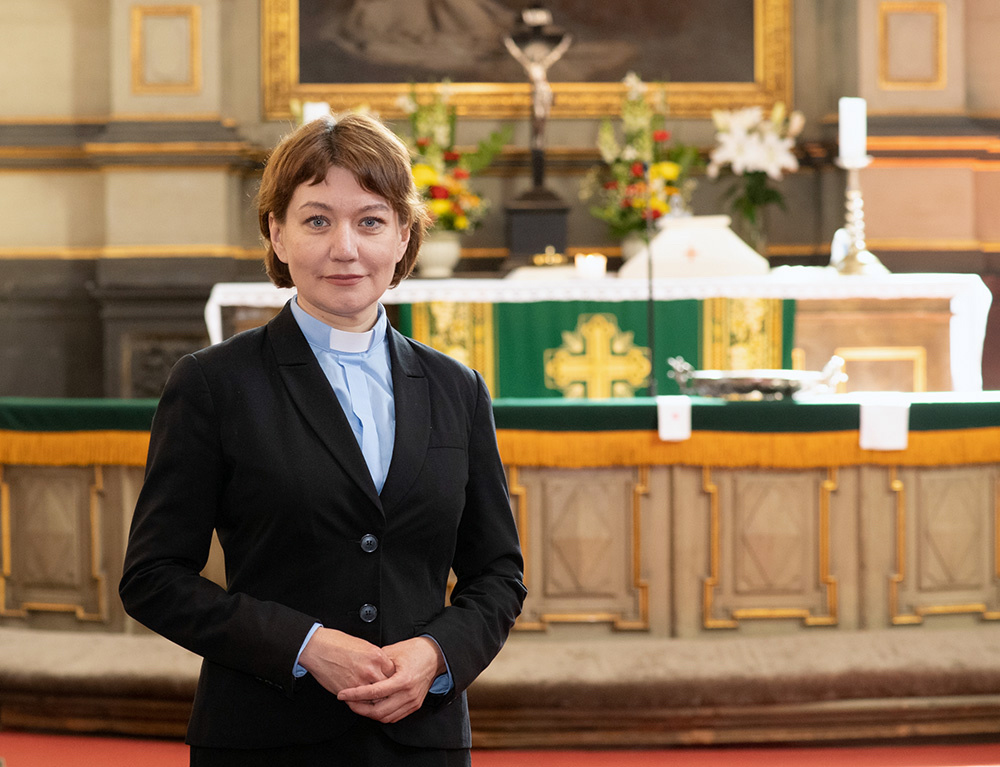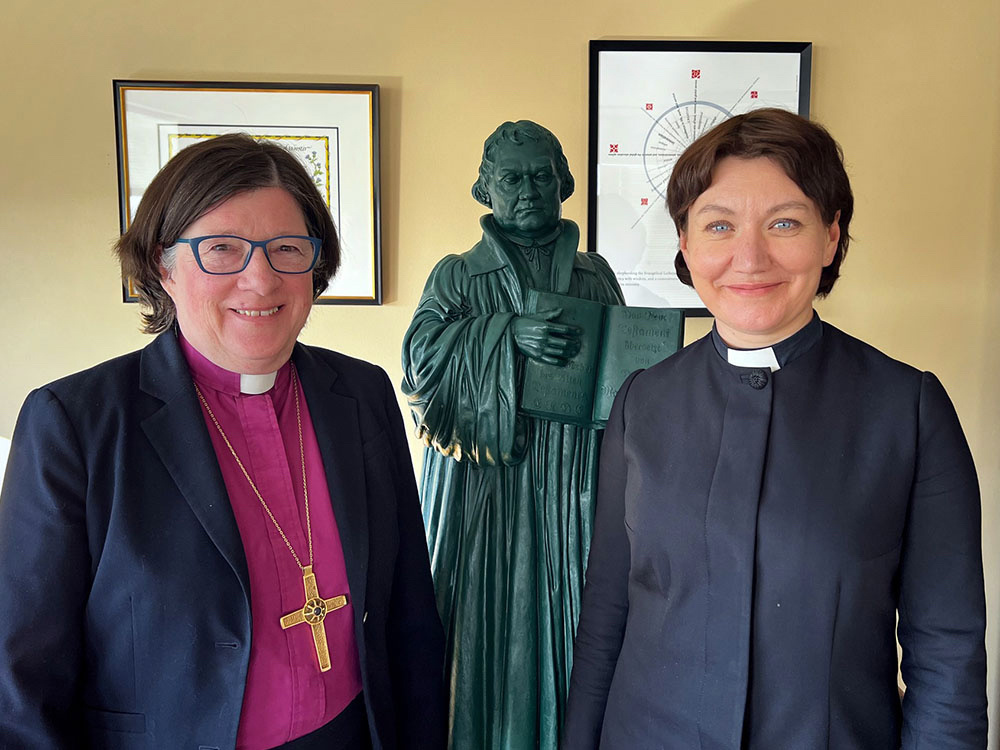
EMILY MCFARLAN MILLER, of Religion News Service, speaks to the Lutheran World Federation Secretary General…
Chicago, US
RNS
When Rev Anne Burghardt was elected general secretary of the Lutheran World Federation in 2021, the Estonian theologian became the first pastor from Central and Eastern Europe to lead the global communion of 148 Lutheran denominations, and the first woman to do so.
The first achievement is important because she believes her region has much to teach the wider church about living in the context of persecution and extreme atheism. As for the second, Burghardt said she hopes her work “will bear good fruits for the lives of our member churches, particularly for the women in our member churches.

Rev Anne Burghardt. PICTURE: Erik Peinar
The Secretary General spoke to Religion News Service last week in Chicago, where she was visiting the headquarters of the Evangelical Lutheran Church in America, the largest Lutheran denomination in the country. She also planned to preach at St Peter’s Church in New York and meet with members of the ELCA’s advocacy team and “key UN stakeholders,” including the Ukrainian ambassador to the UN.
Burghardt’s US visit follows her first trip as general secretary to the Holy Land and the Middle East, where she attended the ordination last month of Rev Sally Azar, the first Palestinian woman ordained as a pastor in the Evangelical Lutheran Church in Jordan and the Holy Land.
The general secretary said she wanted to convey that the “worldwide Lutheran communion is really grateful for ELCA’s continuous support and for the fact that ELCA hasn’t forgotten its sisters and brothers worldwide”…
What were your takeaways from your visit to the Holy Land? What does Azar’s historic ordination mean for the wider church?
“This was indeed a very eye-opening trip for me personally because I [not only] attended the ordination of Sally Azar, but also visited our LWF World Service program and Augusta Victoria Hospital in Jerusalem, which is serving Palestinian people in a very special way. To have an insight into the realities [of] where Palestinian people are living these days was very moving and made it very clear that we need to strengthen our advocacy efforts. We always say that our task is to give voice to the voiceless, and Palestinians, unfortunately, often tend to be the ones who don’t have that strong voice globally.
“Sally Azar’s ordination was, of course, a very special moment, not so only in the life of our member church in the Holy Land, but for the whole region. We hope this will serve as an encouraging example also for other Protestant churches. Knowing that many young Christian Palestinians tend to leave the country, it was also a sign of hope to see that a young person is willing to stay and to serve in her home country.”
You grew up in a secular family and were baptised Lutheran as a teenager. Can you say a little bit about what drew you to the Lutheran church?
“If you look at the clergy in the Estonian Evangelical Lutheran Church today, approximately 50 per cent come from secularised families. There was a big, let’s say, opening at the end of the ’80s, when the Soviet Union was about to break down, and many people came to the church to find their religious roots, in a sense. For many, the Lutheran church was the first and evident choice because this had been the church of their forefathers and mothers.
“I came to church through attending confirmation classes, through asking questions about the meaning of life, the meaning of the world, etc. It was more of a philosophical journey in the beginning, I would say, and very much also linked to the worship life. So I could say that I, in a sense, really entered the church through worship.”
When you were elected, ELCA Presiding Bishop Elizabeth Eaton said you saw the church’s role as a translator and interpreter of the faith for the 21st century. How do you see the Lutheran Church doing that in the US and around the world?
“The Lutheran Church’s big gift is its theology, and the ability of this theology to not give simplistic answers, but to foster critical thinking and ask critical questions and not be afraid of this. In today’s complex world, people are often looking for simplistic answers in order to feel secure, but this is not necessarily what brings us forward.
“Secondly, the clear understanding of holistic mission that consists of proclamation, of diakonia, of worshipping, but also of public witness to hold all these aspects strongly together is definitely something that Lutherans can bring as a gift to the broader Christian family.”

ELCA Presiding Bishop Elizabeth Eaton, left, and Lutheran World Federation General Secretary Rev Anne Burghardt in Chicago. PICTURE: A Danielsson/LWF
What are some of the biggest challenges and opportunities for the Lutheran Church in the US?
“One of the biggest challenges perhaps – not being that deeply acquainted yet with the context the ELCA lives in – is to live up to the commitment to reach to different parts of society, to look beyond one’s own immediate circles, to reach those people who are not the usual suspects to be members of the ELCA. And how to remain committed to being part of the global communion – to understand that when one party is suffering, then the whole body is suffering. It is a challenge for many churches to realise that we serve one part of a bigger body.”
You’ve mentioned the LWF is working on a document on Jewish-Christian relations. Why is dialogue with Jewish communities so important?
“One of the impulses for this process is the fact that the next assembly is going to meet in Krakow in Poland, only approximately 100 kilometers away from Auschwitz, which is almost a symbol for some of the worst atrocities against humanity that have been committed.
“LWF was engaged in relating to Luther’s writings about Jews already in the 1980s, but in recent decades, not much has been done in view of Jewish-Christian relations in particular. So we do hope that, by engaging in this topic now, we are able to inform the constituencies in our member churches about the rise of anti-Semitism and also to counter some wrong and unhelpful narratives that might be spreading through populist politics around the world.”
We rely on our readers to fund Sight's work - become a financial supporter today!
For more information, head to our Subscriber's page.
You’ve written for RNS about the refugee crisis and how the LWF is helping the people of Ukraine. Can you talk about that work?
“We have always been committed to supporting people in need and to supporting refugees because this is part of our DNA and actually one of our four founding pillars. When this war started, we felt that this is something where we need to contribute, where we need to step in and help Ukrainian refugees, who are predominantly women with young children.
“We don’t have a very big member church in Ukraine – it is rather a tiny one – but we have a member church in Poland with approximately 60,000 members, which has been doing amazing work in supporting Ukrainian refugees. We support Ukrainian refugees through the so-called “one LWF” approach, where we bring together our diaconal work in our local member churches and the work of Lutheran World Service, which addresses humanitarian needs and development. So these two strains of work are coming together in Poland particularly, but also in other countries neighbouring Ukraine.”
How does Lutheran theology inform that work?
“This was one of the core convictions of Luther himself. He used to say that through being liberated by God’s grace, we are actually free to serve the others, and being curved in on ourselves is actually what can be described as sin. When we are really liberated by God, then we are liberated not to look at ourselves only, but to turn our eyes to the needs of others. I very much like Luther’s understanding of everyday worship. He says that serving the neighbour through diaconal work, but also through our everyday work – whatever we do, if we do it in a way that is committed to serving the others – this is actually worship that we do outside the Sunday worship.”
This interview has been edited for length and clarity.






